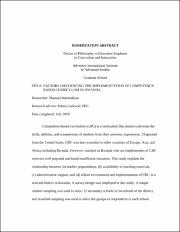| dc.description.abstract | Competence-based curriculum (CBC) is a curriculum that aimed to develop the skills, abilities, and competences of students from their previous experiences. Originated from the United States, CBC was later extended to other countries of Europe, Asia, and Africa, including Rwanda. However, teachers in Rwanda who are implementers of CBC were not well prepared and faced insufficient resources. This study explains the relationship between (a) teacher preparedness, (b) availability of teaching materials,
(c) administrative support, and (d) school environment and implementation of CBC in a selected district in Rwanda. A survey design was employed in this study. A simple random sampling was used to select 22 secondary schools in 54 schools of the district, and stratified sampling was used to select the groups of respondents in each school.
Convenience sampling was used to distribute questionnaires to the available teachers in each school. Out of the 350 teachers who responded to the survey instrument, 29.6% were female and 70.4% male within the age range of 20 and above.
There was a high perception in teacher preparedness (M = 3.50, SD = .75) and average (M = 3.102, SD = 0.6452) perception in teaching material availability. In administrative support, teachers showed an average (M = 3.338, SD = 0.8201) perception. An independent sample t-test showed a statistically significant difference between male and female in terms of teaching materials availability (t = -2.123, df = 333, p = .034). In addition, one-way ANOVA test showed a statistically significant difference of perception in teacher preparedness, F (3, 316) = 4.309, p = .005, and social environment, F (3, 316) = 2.881, p = .036, for the different age categories. Furthermore, in the educational attainment, the results showed a statistically significant difference in the administrative support, F (3, 325) = 3.008, p = .030, and social environment, F (3, 325) = 3.008, p = .017. There was also a statistically significant difference in teacher preparedness among the categories of years of service, F (2, 307) = 6.598, p = 0.02, and administrative support, F (2, 307) = 3.386, p = .035. There was also a statistically significant difference in administrative support among the categories of school status, F (2, 312) = 6.573, p = 0.02, and social environment, F (2, 312) = 3.312, p = 0.38.
Further, findings showed a strong positive correlation between teacher preparedness and implementation of CBC (r = .567**), administrative support and implementation of CBC (r = .634**), and school environment (r = .533**). There was also a moderate positive relationship between teaching material availability and implementation of CBC (r = .445**), and physical environment and implementation of
CBC (r = .495**). Overall, all the predictor variables in this study explained 55.2% of the variance observed in the implementation of CBC (R2 = .552). Future studies may be conducted on other variables that might predict the implementation of CBC, such as teachers’ motivation and the number of students in the classroom, among others. | en_US |

